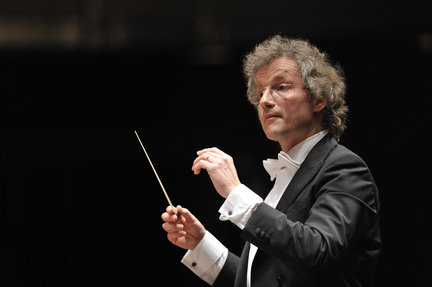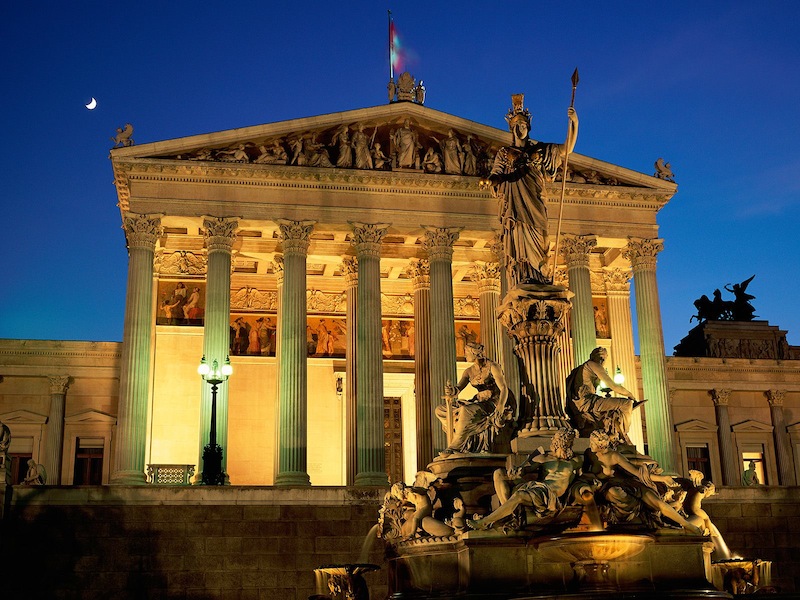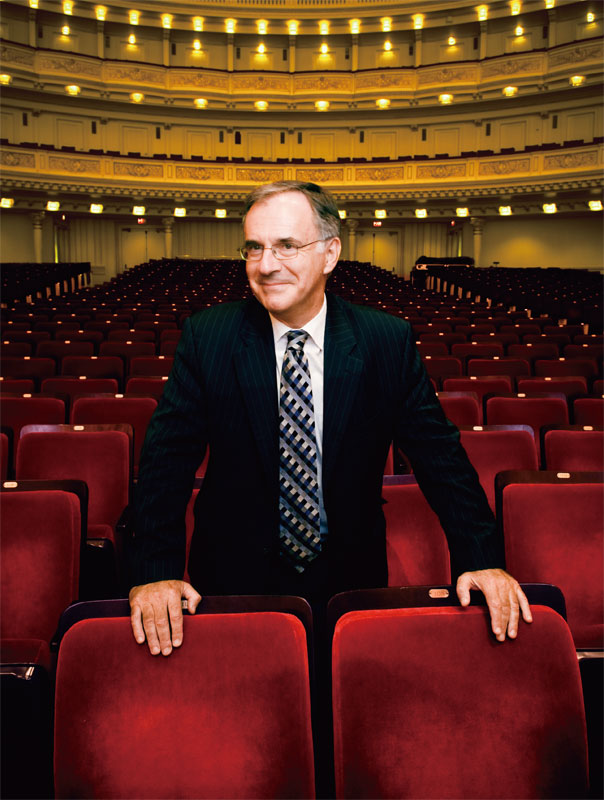Carnegie Hall to lead citywide festival exploring Vienna’s rich musical history
If any single place on the globe can be described as the historical center of classical music, it is Vienna. The Western classical tradition is dominated by music that came out of and through Vienna. Its musicians, impresarios and composers are bookended by the giants Haydn, Mozart, Beethoven and Schubert—and the composers who ushered out romanticism and opened the door to the modern era: Schoenberg, Berg and Webern. In between, the city hosted the works of Schumann, Brahms, Wagner, Bruckner and Mahler.
“Vienna: City of Dreams,” a three-week citywide festival organized and anchored by Carnegie Hall, opens this Friday and will present an enormous amount of this history. Musical history, of course, but also the artistic, intellectual and political ideas in and around turn of the century Vienna, a collection of ideas that were some of the most creative and the most destructive in history. More than just a frozen snapshot of the past, through music, films, talks and exhibitions, the festival will make explicit connections between the past and the present, the world that would be unimaginable without the city.
At the center of the festival in terms of weight and significance is a series of seven concerts from the Vienna Philharmonic Orchestra, and two more in their association with the Vienna State Opera. The origins of the festival come out of the orchestra’s long relationship with Carnegie Hall. Since their first appearance in 1956, the orchestra has played at the venue over one hundred times, including twenty-seven consecutive annual visits since the 1985-86 season. No other non-American orchestra has made it to the hall so often.
“The seeds of the festival go back many years,” said Carnegie’s executive and artistic director, Clive Gillinson describing the genesis as coming out of on-going conversations with the VPO and its president, Clemens Hellsberg. “With all festivals we always plan between three and five years in advance.”
The central idea, as with previous Carnegie festivals, is to paint a larger picture and “to bring people outside their comfort zones and their expectations,” he added. “On top of that we want to create a cross-cultural context for what we are doing in the concert hall, so we talk to [relevant] institutions. We just want to tell what is a really a compelling story.
“It’s not countries, it’s not cities, it’s ideas and stories. So we just felt Vienna around the turn of the century is such an unbelievable story in so many ways. It was a period when Vienna and Austria really were at the center of Europe, intellectually, artistically and politically as well. We wanted to do this, and the timing really related to when we could do this with [the VPO], and the Vienna State Opera—doing seven concerts is really an enormous commitment. It was really a question of how to put together such a complex project and when can that work.”
The bulk of the programming is fin-de-siècle. After a grand opening concert of Beethoven’s Symphony No. 9 from the Vienna Philharmonic and Vienna State Opera on February 25 under conductor Franz Welser-Möst, the major orchestral works are Bruckner’s Symphony No. 6 on February 26; Brahms’ Symphony No. 3 on March 13, led by Andris Nelsons; Mahler’s Symphony No. 4, with soprano Juliane Banse and Christoph Eschenbach filling in for the injured Daniele Gatti, March 15; and Zubin Mehta leading a mix of arias and concert pieces from Mozart, Wolf, Lehár, Josef and Johann Strauss, Webern and others, with violinist Gil Shaham and soprano Diana Damrau, March 16.
Those concerts make the base of a pyramid, with an apex formed by two operas in concert, Wozzeck on February 28 and Salome on March 1. Gatti was the original conductor for each, but the transition to his replacements should be seamless. Welser-Möst will conduct Wozzeck and Nelsons will lead Salome. Each opera is part of the current repertory season at the Vienna State Opera, the company for which Welser-Möst has been the general music director since the 2010-2011 season. Nelsons is already preparing another concert performance of the Strauss opera in his position as music director designate of the Boston Symphony.
“I genuinely find concert performances of opera can be unbelievably fulfilling in every way,” Gillinson said, “when the music can be absolutely at the forefront. It’s the theater of your imagination, and very often I enjoy it more than normal opera productions.”
The two operas are very different works from drastically different composers that yet still join to fill out the image of the “city of dreams,” because nightmares are dreams too. Wozzeck, a weird microcosm of a demented, authoritarian, inhumane society, during and after World War I, is colored in atonal language but composed with near Apollonian perfection in forms like sonata-allegro and passacaglia. It was banned by the Nazis in 1933.
Salome is far-less dreamlike but also far more lurid. The opera premiered in 1905 but Viennese censors did not allow it at the State Opera until 1918. Strauss’ compositional skill and style are sensational, even sensationalistic, and his highly chromatic language is ultra-expressive, both of the drama and of the untenable state of harmony in late-romantic classical music. To some ears, including those of Berg’s teacher Schoenberg, the music could sound like the burgeoning decadence of the world around them.

Franz Welser-Most will lead the Vienna Philharmonic Orchestra’s opening concert on Feb. 25 as well as a concert performance of Berg’s “Wozzeck.” Photo: Roger Mastroianni
Between them, they frame Vienna at the turn of the 20th century. Gillinson explained: “We just felt [the turn of the century] was a pivotal movement, frankly, in the history of the world. Not only politically, but combining that with this unbelievable richness of creativity in Vienna. Classical music has always been at the heart of Vienna, we felt that this was the more powerful story that traversed much more than the music.”
This year is also the centennial of the start of World War I. “That’s something we were always aware of, and all of us felt if we could tie it in with that [it would be beneficial]. We wouldn’t have pushed a festival into that period if it didn’t work in other ways.”
The Vienna Philharmonic has publicly explored the details of its own place in this history. A year ago, Hellsberg commissioned a group of historians—Bernadette Mayrhofer, Fritz Trümpl and Oliver Rathkold—to contribute their own research, via newly available documents in Austrian and German archives, on the orchestra’s relationship to Nazism to the Philharmonic’s archives.
The material collected so far at the VPO website includes not only a list of Jewish musicians who were exiled from the orchestra, some to die in concentration camps, but also papers on the orchestra’s involvement with politics during WWI and the post-war period of authoritarian governments, their role in promoting cultural nationalism, and even their Nazi era repertoire.
While is impossible to divine the balance between political and musical considerations in the programming of this era, Trümpl has pointed out that prior to Germany’s annexation of Austria in the Anschluss of 1938, the orchestra had already been limiting performances of composers prohibited by the Nazis, like Mahler and Mendelssohn, while the frequency of Bruckner’s symphonies increased as did, after annexation, the music of Wagner, the latter doubling after 1938.
One of the fascinating and disturbing details is that the tradition of the Johann Strauss New Year’s concerts began under Nazism, December 31, 1939, and that the music of Strauss itself was integral to the “Nazi regime’s propaganda-by-entertainment strategy,” in the words of Rathkold (which also elicited Joseph Goebbel’s fear that Strauss’ one-eighth Jewish heritage might be discovered).
These are some of the topics that will be explored in several talks. Rathkolb will chair a symposium on March 2, on the influence of fin-de-siècle Viennese music; and another panel will explore the effect of politics on the city’s culture up to 1914, February 24. On February 27, Morley Safer will moderate a panel, including Rathkolb and Hellsberg, discussing the culture of Vienna up the Anschluss and the work to recover that history. Most of these panels are fee, but reservations are required.
One of the venues for the talks is the Austrian Cultural Forum. The ACF began as a child of history, the Independent Austrian Institute, founded in 1942 by émigrés from Austria who fled fascism. Their initial charter was to restore the Austrian Republic, and after WWII this changed to the exploration and promotion of Austrian culture.
The ACF has been a partner in organizing the festival almost since the beginning, and Gillinson praised them as “enormously helpful, firstly in creating programming as part of the festival, and giving us advice. They were very much one of our thought-partners as well.”
Austrian Cultural Forum director Christine Moser points in particular to a recital at the ACF on February 27 by Matthias Schorn as an example of their promotion of contemporary Austrian culture. Schorn is the principal clarinetist of the VPO, and will play a concert of music written for and dedicated to him by contemporary composers like Friedrich Cerha, Thomas Gansch and Richard Trautwein. Also playing new music written especially for the performer will be pianist Seda Röder, with a program of miniatures from Austrian composers, also at the ACF, on March 11.
Moser shares Gillinson’s attitude about festivals: “The art is amazing … so I think it’s certainly a program to get you out of your comfort zone.” Particularly interesting is a March 9, one-day festival within the festival at (Le) Poisson Rouge: “The Improvised Traumdeutung” (Interpretation of Dreams). This is part of the ACF’s The Austrian Scene: a series of performances by Austria’s leading improvising musician, based around the music of Anton Webern.
One of the key events to link music performance with discussion and inquiry will be hosted by the Forum on March 2. “Vienna’s Musical Production During the Great War” is a concert of romantic chamber pieces played by musicians from the Vienna Philharmonic. Music historian Christian Glanz will introduce the program. “This will also be a moment of reflection on 1914 and 2014, which is a whole track of the panels in the festival.”
The festival programming includes films, in tandem with the Museum of Modern Art and the Paley Center, including an experimental movie, Trains of Thought (screening at the ACF March 16), about subway undergrounds in cities all over the world, with live music. The ACF also has their “little corner,” in Moser’s words, called “The Vienna Complex,” from February 27 to May 25, an exhibition examining the culture of self-improvement, what she, quoting Frederic Morton, called “success mania, the quest to perform and immediately optimize everything” as an outgrowth of psychoanalysis.
For the ACF, there is music at the close: a March 31 concert of chamber music from Ernst Krenek (Krenek’s widow Gladys Nordenstrom will be in attendance) and, of course, a night of Viennese cabaret, with chanteuse Sanda Weigl and actor Klaus Pohl, accompanied by Rob Schwimmer at the piano, April 1. All programs and performances at the ACF are free, but reservations are required (reservations for “The Improvised Traumdeutung” are available by sending an email to [email protected].
Back at Carnegie, not all the music is strictly “classical,” but all the music is directly and deeply connected to Vienna. The electronic musician Fennesz will explore this explicitly in Zankel Hall on March 7, in a concert titled “Mahler Remixed.” Fennesz will be interpolating and remixing Mahler’s music, accompanied by digitized visualizations from digital artist Lillevan. The following night at Zankel, the Zawinul Legacy Band will play the music of Joe Zawinul, the great Viennese keyboard player, co-founder of Weather Report and one of the most important jazz musicians of the 20th century.
Of the festival overall, Gillinson adds “You have to put together a project that is all highlights, you shouldn’t put them in there if they weren’t. What I’m most excited about is the journey.”
“Vienna: City of Dreams” runs from February 21-March 16. For a complete listing of events, go to carnegiehall.org/vienna and acfny.org/events.








